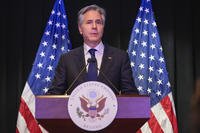President Obama's visit to the Pentagon on Thursday had more subplots than a Telemundo soap opera, and it's worth taking a moment to try to unpack them all.
First, reality: The president, Secretary Panetta and other top defense officials effectively had nothing new to say, although the paper "strategy" they unveiled did include a few interesting tidbits about the coming defense build-down. If the packed room full of reporters expected how many F-35s the U.S. will delay, or the number of troops it will cut, they came away disappointed. All that will be in the annual budget submission, the speakers promised.
Second, the national politics: It was puzzling that Obama wanted to make Thursday's otherwise humdrum white-paper release -- something that happens like clockwork every few months -- into a national story. His Republican opponents in this year's election accuse him of "gutting" defense; former Massachusetts Gov. Mitt Romney, for example, has a made growing the Navy's fleet one of his key national defense goals.
(There are serious questions to be raised about its feasibility and all the Republicans' national security credentials, but let's leave that aside for now.)
So at a time when Republicans are dominating the national stage with the coming New Hampshire primary, their favorite enemy has handed them a fresh news cycle's worth of conservative jeers about Obama protecting their hated social programs over the vital defense of our great nation. You know how it goes. In fact, he created two stories where there could have been one: A high-profile prelude that will only lead to a second splash of coverage when the budget, with all its real numbers, eventually comes out.
Obama clearly anticipated this kind of rhetoric in his appearance Thursday, and he was ready with a fact that almost everyone tries to sweep under the rug amidst the never-ending budget crisis.
"I think it’s important for all Americans to remember, over the past 10 years, since 9/11, our defense budget grew at an extraordinary pace. Over the next 10 years, the growth in the defense budget will slow, but the fact of the matter is this: It will still grow, because we have global responsibilities that demand our leadership. In fact, the defense budget will still be larger than it was toward the end of the Bush administration. And I firmly believe, and I think the American people understand, that we can keep our military strong and our nation secure with a defense budget that continues to be larger than roughly the next 10 countries combined."
Maybe the White House is gambling that the American people don't actually care, as they've shown time and time again on major military and security questions. And in fact, as we've said before, there is a perception that out-of-control Pentagon waste and spending have put America's financial ox cart in the ditch. Maybe Obama believes a photo-op at the Pentagon actually will be a political win.
Third, there was the Washington politics narrative. Obama's sanguine characterization that DoD has, and will continue to get, plenty of money puts him at odds with Panetta and his top lieutenants. They have screamed for months about how tough it would be just to deal with their first round of budget reductions, and how the prospect of next year's "sequestration" would simply be unthinkable.
Obama did not mention sequestration at his visit to the Pentagon, and Panetta only threw in a cursory reference at the end of his remarks. Panetta and Deputy Secretary of Defense Ash Carter were both asked whether they thought the sacrifice that Thursday's rollout represents would buy DoD enough good will with Congress for it to avert sequestration. They both said, effectively, we hope so.
And yet Obama has put Panetta in a bind: Obama has vowed to veto any attempt by Congress to let the Pentagon escape sequestration unless it's part of a "comprehensive" $1.2 trillion deficit reduction bargain -- the one the supercommittee couldn't get. So Panetta has to oppose a congressional escape route, too. House Armed Services Committee Chairman Rep. Buck McKeon and other lawmakers are trying to throw the Pentagon a lifeline, but it just …. can't … reach!
This and other melodramatic scenes will again become commonplace this year, as the two sides both warn about the dangers of the budget guillotine while at the same time dismissing it. DoD still apparently does not plan to plan for the possibility, and Hill defense advocates apparently have given up on trying to get the "comprehensive" deal that the White House wants. Everyone just appears to assume the worst won't happen.
So after all the D.C. hubbub about Obama's visit and Panetta's rollout -- the impasse continues.








